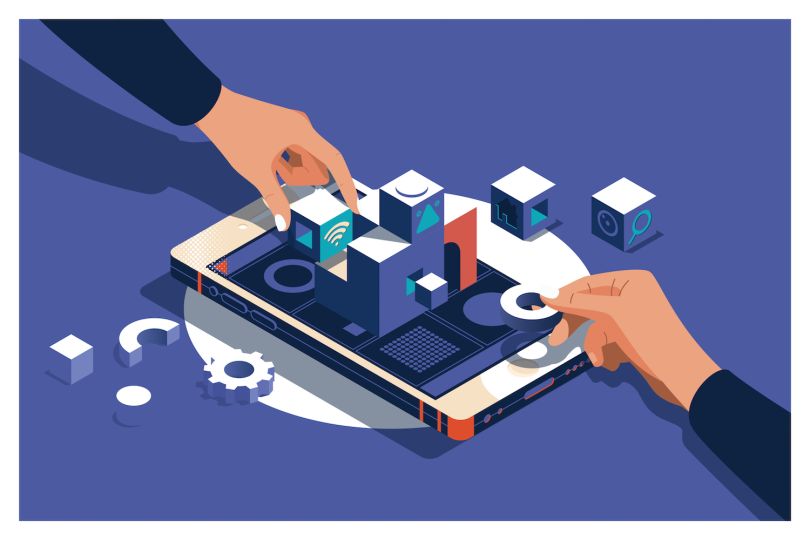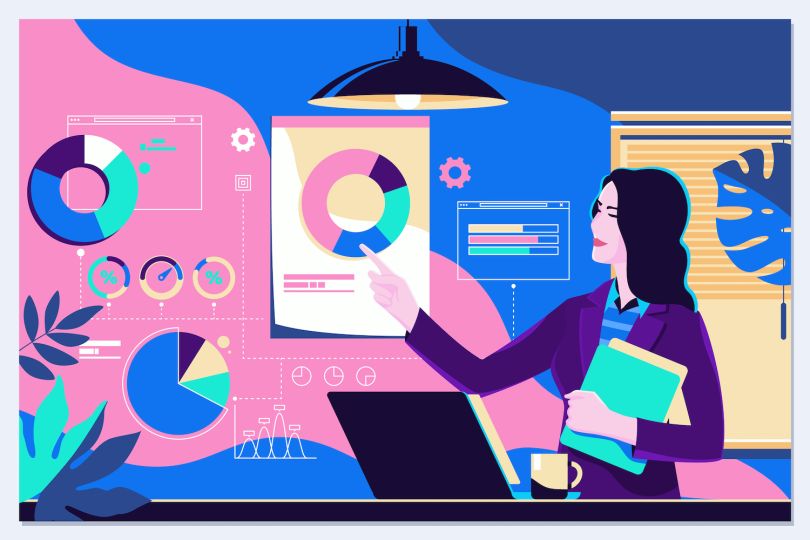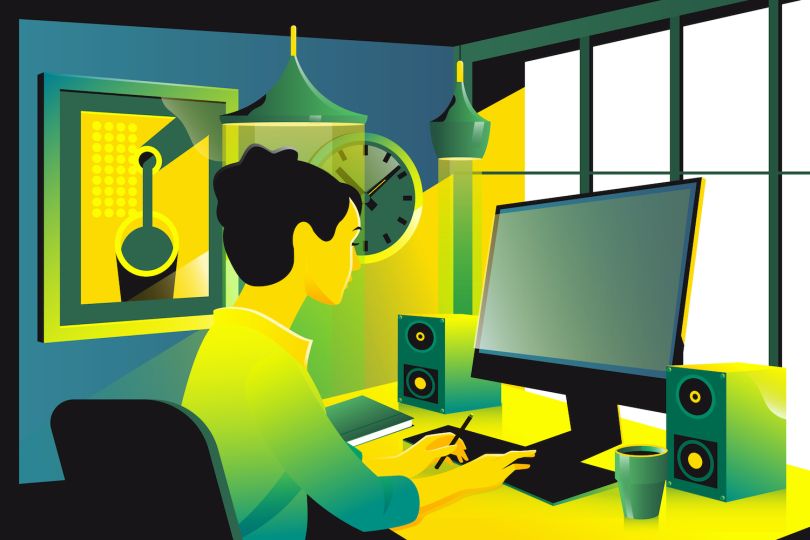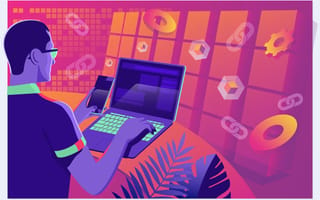You don’t need to be a writer — or even a human — to churn out news stories, as this bot demonstrated. Turns out, the same can be said of writing software.
A new breed of platform harnesses the power of automation to let non-coders spin up applications with the click of a few buttons. No-code tools are entirely visual, as users make selections and assemble components into place, while low-code tools leave room for small bits of code to supplement the platform’s capabilities.
This model of developing software works, by all indications. In this article for Forbes, OutSystems CEO Paulo Rosado claims that low-code development helps organizations deliver software 10 times faster than traditional programming. Gartner predicted that 65 percent of app development will happen on low-code platforms by 2024. And low-code platform Salesforce, which lets companies adjust its CRM software on demand, counted 99 Fortune 100 companies among its customers as of 2018.
Meanwhile, technologists like Brent Summers preach the gospel of no-code. Summers himself built and sold Code-Free Startup — a learning tool for aspiring app entrepreneurs — without writing any code at all.
“I’m a terrible developer,” Summers wrote on the tool’s Product Hunt page. “I’ve always dreamed of building great software that people love, but instead, I end up swearing at my computer and abandoning projects as soon as I get stuck. But about eight months ago, this changed when a friend showed me a bunch of ‘no-code’ tools like Bubble, Typeform and Blockspring. After a few months of learning, I challenged myself to make an Airbnb clone without writing code. Ten hours later, I was done, I was tired and I was hooked.”
Instead of paying a vendor to customize business software, companies use Salesforce. Instead of partnering with a skilled programmer, Summers assembles a minimum viable product himself. Low-code and no-code development make life easier. But, as their reach grows, will they change the developer job market for the worse?

Who’s a Programmer, Anyway?
I hopped on a Zoom call with Zoelle Egner, a marketing manager at low-code platform Airtable, to see the tool in action. Within minutes, she’d uploaded the haphazard spreadsheet where I track my story ideas and interviews and turned it into an application that displays the progress of stories, logs relevant research and even sends thank you emails to sources after articles publish. There was no coding involved — just clicking and selecting — but we ended the call with a program that seemed like it could rival any story-tracking app designed for reporters.
So, are Egner and I programmers?
Many would say no. The programming we did was entirely abstracted, in that any commands a computer would understand were hidden beneath layers of more visual, human-friendly components.
Developers have a longstanding tendency to view abstracted programming languages and environments as less than legitimate. But that’s put them on the wrong side of history before.
People once looked down on languages like Python, Ruby, JavaScript and COBOL because they weren’t as “close to the machine” as C, Airtable engineer Mary Rose Cook told me. There’s still tension between developers who use old-school text editors like vi or Emacs and developers who’ve moved to more visual, integrated development environments, advisory CTO Alex Hudson mentioned.
“We still haven’t really sorted out that kind of snobbery.”
Ultimately, all software — including programming languages — operates at different levels of abstraction, airSlate director of customer solutions Colin Teubner said. Even a .docx file is an abstracted set of instructions telling a computer how to print something.
“We still haven’t really sorted out that kind of snobbery,” Hudson said. “We haven’t really figured out that there is a large set of productivity gains potentially to be had by using graphical tools like low-code and by using domain-specific languages. None of this stuff is new, right?”
The productivity gains Hudson mentioned come in two forms. One: Companies can get user-ready applications faster than ever. And two: App-building becomes accessible to non-programmers.
Whether Egner and I count as programmers, then, doesn’t really matter. What does matter is whether, with the help of low-code or no-code platforms, people without coding training could ever replace a developer on the job.

On One Hand, No...
According to Teubner, low-code and no-code won’t siphon jobs from developers because those platforms don’t facilitate the work devs do in the first place.
His employer, airSlate, for instance, is a no-code platform for workflow automation. Large companies already have developers on staff for custom software needs, while the small and medium companies he works with would probably never consider hiring developers for internal tooling.
“The idea, for them, of hiring freelance developers or full-time developers to build custom software is just completely out of the question,” he said.
Usually, ambitious analysts or revops employees take on the task of creating and maintaining workflow applications with airSlate. When that happens, more people are empowered to create programs without replacing any actual programmers. And those people are a lot closer to the workflows in question, which makes for better software.
The democratization angle is a big one for no-code and low-code companies, Cook said, but making software development more accessible to non-programmers isn’t the only aim. Full-fledged developers also have something to gain by using these tools.
“Those things don’t threaten developer jobs because they actually make the developer more valuable.”
Cook herself builds on Airtable all the time.
“It just feels quicker,” she said. “That’s partly because it’s a fun application to use and partly because Airtable abstracts away from you some of the things that don’t pertain directly to what you’re trying to achieve. So that might be things like data storage, or reading and writing data, or dealing with permissions or logins or hosting. When I’m trying to write some app to, like, recommend films to myself, I don’t want to deal with any of that stuff.”
In other words, the platform automates some of the developer’s work, but it’s the stuff they don’t want to do anyway. If they’re using that automated platform on the job, it may free them up to think about new ideas or broader technical challenges.
“Those things don’t threaten developer jobs because they actually make the developer more valuable. They’re able to turn out more applications more quickly, and maybe there are fewer errors from the beginning,” Teubner said.
So, no-code and low-code platforms have the potential to boost the business value of programmers and non-programmers alike. Thanks to abstraction, non-technical employees can quickly spin up common types of applications and mold them to their immediate needs. Thanks to automation, devs save time on repetitive tasks like data entry or reporting.
Of course, there are still plenty of ways for no-code and low-code to go awry. Both programmers and non-programmers can quickly lose track of the architecture of what they’re building, which makes for jumbled, poorly performing software, according to Hudson.
“These systems work very well on the small scale — that functional-level process where you’re looking at small pieces of logic — but when you’re trying to piece it all together and see how all these things interact, it just becomes really, really difficult,” he said.
For example, a business analyst could build an elaborate CRM system and find that there’s zero visibility into how a customer moves through that system, or a dev could find out too late that their app idea runs smack into a low-code platform’s architectural limits.
Those limits, however, are fading away as automation advances. Today, low-code doesn’t steal jobs from devs because it can’t do what devs do. A low-code tool can create a database with the click of a button, for instance, but it can’t integrate an app with an outside system.
But what if it learned?

... On the Other Hand, Maybe
No-code and low-code platforms are domain specific, which means they work for building particular types of applications. Right now, those applications largely deal with managing processes. If you want something more complex, you’ll likely need a developer to write some code.
However, that doesn’t mean that developers are safe from the relentless forward march of automation, Hudson said. If a machine learning model can write a news story, it can write a program, and the question isn’t if, but when.
“That’s the latent fear of a lot of people in the workforce, in whatever sector, and there’s just no reason to think that software developers will be immune from that,” he said. “History tells us it’s going to happen, and there’s nothing special about software developers that wasn’t special about actors and filmmakers and screenwriters.”
Perhaps the difference is that software development may be the only job market that could eat its own tail. If automation comes for the developers, it will have been the developers that made automated programs advanced enough to do so.
“Maybe the role of humans in 50 years’ time is not going to be writing software at all,” Hudson added. “That would just be similar to how industry has worked over the past 150 years.”
Whether you believe the technology that powers no-code and low-code platforms will truly make programmers less relevant, though, depends on your view of programmers, Cook told me.
“There’s this huge well of humanity in programming that feels like a far cry from an AI that can build software.”
She thought back to the 1970s, when computers first made the shift from glorified calculators to tools for human expression. If programs are just a means to get things done, then sure, developers should be worried about automation’s growing capabilities. But if programs are a means for humans to creatively tackle new problems, explore new philosophies and even make art, the need for programmers will never go away.
Maybe one day, a machine learning model will be able to create AR tooling, write a video game engine or replicate other tricky programming maneuvers. Perhaps, as Hudson mused, humans will even hit a wall with software’s performance just as they have with hardware’s performance.
But the world will still need humans to dream up new solutions and forms of expression. That’s to say: The world will always need programmers, even if we’re not sure exactly what it is they’ll be programming.
“At the moment, I struggle to imagine that artistic or philosophical view of programming being captured by any [automation] that I’ve seen so far,” Cook said. “There’s this huge well of humanity in programming that feels like a far cry from an AI that can build software.”

What Drives Demand for Developers?
In short: No-code and low-code aren’t a threat to developer jobs — not now, and probably not in the future.
“Developers have more than enough to do. In fact, there’s a huge shortage of them,” Teubner said. “So, we’re not really talking about firing developers and replacing them with [non-technical employees] and no-code tools. We’re just freeing them up to work on things that only developers can do.”
Cook imagined programming work as a big pie. Yes, some of the slices that used to belong to developers now belong to other people. But the pie itself is getting bigger and bigger as more of the world runs on software.
No-code and low-code help address that growing pie. The platforms may serve as an on-ramp for users who go on to learn more about coding, and they give everyday people some of the same problem-solving tools available to programmers.
“You can imagine a future where the people who work at a power company are able to build their own software to help manage that power company.”
“You can imagine a future where the people who work at a power company are able to build their own software to help manage that power company,” Cook said. “To me, it seems empowering and exciting that those people are able to determine how [the software] works, rather than having that dictated by another group of people who maybe don’t understand the problem as deeply.”
Ultimately, Teubner said, programmers have never been in demand because they can code, but because they add value. No-code and low-code, when used strategically, boost value for everyone.




